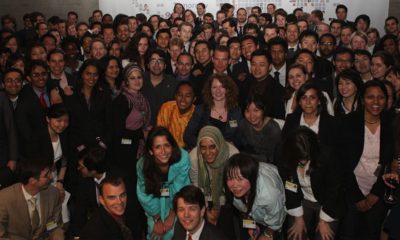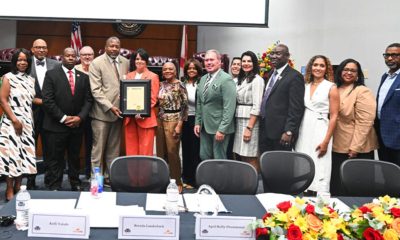Business
McDonald’s CEO Steps Down as Sales Decline

In this Jan. 13, 2012, file photo, Don Thompson, McDonalds President and Chief Operating Officer, speaks during a news conference in Innsbruck, Austria. McDonald’s Corp. has tapped Steve Easterbrook as its new president and CEO to succeed Thompson, who has helmed the burger chain about two and a half years, the company announced Wednesday, Jan. 28, 2015. (Kerstin Joensson/AP Images for McDonalds, File)
CANDICE CHOI, AP Food Industry Writer
NEW YORK (AP) — McDonald’s CEO Don Thompson is stepping down as the world’s biggest hamburger chain fights to hold onto customers and transform its image.
The company said Thompson, who has been CEO for two-and-a-half years, will be replaced by Steve Easterbrook, a company veteran who rejoined McDonald’s as its chief brand officer in 2013.
McDonald’s Corp., which has more than 36,000 locations around the world, is struggling amid intensifying competition and changing attitudes about food. Customer traffic at established locations in the U.S. fell 4.1 percent last year, following a 1.6 percent decline in 2013. It’s also trying to recover after a supplier scandal in China that damaged its reputation.
On Wednesday, McDonald’s said Thompson will retire March 1 after nearly 25 years with the company. Thompson, 51, was the first African-American to head the company since it was founded in 1955.
“It’s tough to say goodbye to the McFamily, but there is a time and season for everything,” he said in a statement.
A representative for McDonald’s said an unspecified number of employees at the company’s headquarters in Oak Brook, Illinois and elsewhere were also notified of layoffs on Wednesday. In after-hours trading, shares of McDonald’s jumped 3 percent to $91.79. The stock has declined about 6 percent in the past year while broader markets are up in the double digits.
With Easterbrook’s promotion, McDonald’s is continuing its tradition of promoting from within, noted Darren Tristano, a restaurant industry analyst with Technomic. That could be a drawback for a company that is struggling to keep up with a rapidly changing industry.
“Sometimes, you need fresh perspective,” Tristano said, adding that the competition has been “evolving faster than McDonald’s products have been.”
Despite the pressures McDonald’s is facing, the timing of Thompson’s departure was a bit of a surprise considering the numerous revitalization efforts the company recently announced, said Richard Adams, a consultant for McDonald’s franchisees. And he noted the CEO change leaves open the question of whether McDonald’s will shift course on those initiatives.
“Is everything going to change, or are Don’s plans going forward?” Adams said.
Here’s a look at the challenges Easterbrook, 48, will inherit as McDonald’s new CEO, and the changes that are already under way.
___
FAST FOOD IS JUNK FOOD
McDonald’s is trying to shake perceptions that fast-food is cheap, greasy and made with mysterious ingredients.
To dispel myths about its food, the company recently launched a campaign inviting people to ask frank, sometimes squeamish questions about its menu offerings, such as “Does McDonald’s beef contain worms?” and “Do McDonald’s buns contain the same chemicals used to make yoga mats?”
Part of the problem for McDonald’s and other traditional fast-food chains is that people are gravitating toward food they feel is more wholesome or made with higher quality ingredients. And newer places like Chipotle and Panera are positioning their food as just that.
Mike Andres, president of McDonald’s USA, said last month that the company is looking at shrinking the number of ingredients it uses and employing different cooking procedures to enhance the appeal of its food.
“Why do we need to have preservatives in our food?” Andres asked. “We probably don’t.”
___
BLOATED MENU, CLUMSY SERVICE
McDonald’s has conceded its menu in the U.S. has gotten bloated. In just the past decade, the company has said it added 100 items to its menu. That slows down service because it takes customers longer to figure out what they want, while also complicating kitchen operations.
It also increases the chances that orders will be wrong.
As such, McDonald’s has said it’s looking at a simplified menu that reduces the number of Value Meals, and trims items that may be repetitive, such as variations of the Quarter Pounder with different toppings.
___
PICKIER CUSTOMERS
The ability to customize orders is gaining popularity. At Chipotle, for instance, people like that they can walk down a line and dictate exactly what goes into their bowls and burritos.
In hopes of giving customers more flexibility in adjusting their burgers, McDonald’s rolled out new prep tables that can hold more condiments and toppings. It also has more dramatic plans in the works.
McDonald’s says it will roll out an option that lets people build their own burgers at 2,000 of its more than 14,000 U.S. locations later this year. The food takes a bit longer to prepare, but the company is hoping customers will think it’s worth the wait.
___
PRICES TOO HIGH
A major attraction of McDonald’s is that the food is supposed to be affordable. But prices have gotten a bit high for some people.
The popular Dollar Menu is one reason for the skewed prices. To offset the deals on that menu, McDonald’s has admitted that other parts of the menu got too expensive.
In turn, the company has said that prompted people to “trade down” to the Dollar Menu. And that left many customers associating the McDonald’s brand with its cheapest items.
Affordable food is also more widely available elsewhere, with convenience stores and supermarkets expanding their prepared food and coffee offerings.
____
Follow Candice Choi at www.twitter.com/candicechoi
Copyright 2015 The Associated Press. All rights reserved. This material may not be published, broadcast, rewritten or redistributed.
Activism
Sen. Lola Smallwood-Cuevas Honors California Women in Construction with State Proclamation, Policy Ideas
“Women play an important role in building our communities, yet they remain vastly underrepresented in the construction industry,” Smallwood-Cuevas stated. “This resolution not only recognizes their incredible contributions but also the need to break barriers — like gender discrimination.
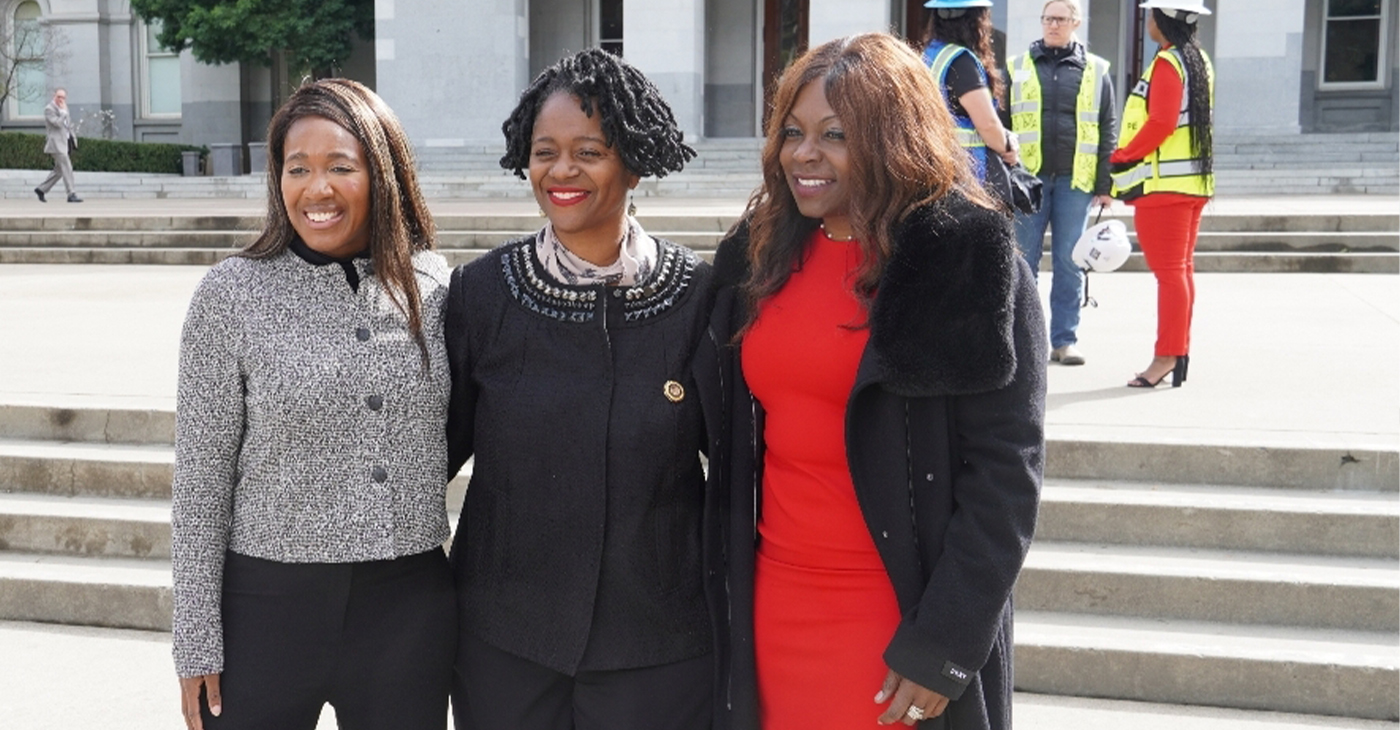
By Antonio Ray Harvey, California Black Media
To honor Women in Construction Week, Sen. Lola Smallwood-Cuevas (D-Los Angeles), a member of the California Legislative Black Caucus (CLBC), introduced Senate Concurrent Resolution (SCR) 30 in the State Legislature on March 6. This resolution pays tribute to women and highlights their contributions to the building industry.
The measure designates March 2, 2025, to March 8, 2025, as Women in Construction Week in California. It passed 34-0 on the Senate floor.
“Women play an important role in building our communities, yet they remain vastly underrepresented in the construction industry,” Smallwood-Cuevas stated. “This resolution not only recognizes their incredible contributions but also the need to break barriers — like gender discrimination.
Authored by Assemblymember Liz Ortega (D-San Leandro), another bill, Assembly Concurrent Resolution (ACR) 28, also recognized women in the construction industry.
The resolution advanced out of the Assembly Committee on Rules with a 10-0 vote.
The weeklong event coincides with the National Association of Women In Construction (NAWIC) celebration that started in 1998 and has grown and expanded every year since.
The same week in front of the State Capitol, Smallwood, Lt. Gov. Eleni Kounalakis, Assemblymember Josh Hoover (R-Folsom), and Assemblymember Maggie Krell (D-Sacramento), attended a brunch organized by a local chapter of NAWIC.
Two of the guest speakers were Dr. Giovanna Brasfield, CEO of Los Angeles-based Brasfield and Associates, and Jennifer Todd, President and Founder of LMS General Contractors.
Todd is the youngest Black woman to receive a California’s Contractors State License Board (A) General Engineering license. An advocate for women of different backgrounds, Todd she said she has been a woman in construction for the last 16 years despite going through some trying times.
A graduate of Arizona State University’s’ Sandra Day O’Connor College of Law, in 2009 Todd created an apprenticeship training program, A Greener Tomorrow, designed toward the advancement of unemployed and underemployed people of color.
“I always say, ‘I love an industry that doesn’t love me back,’” Todd said. “Being young, female and minority, I am often in spaces where people don’t look like me, they don’t reflect my values, they don’t reflect my experiences, and I so persevere in spite of it all.”
According to the U.S. Bureau of Labor Statistics, only 11.2% of the construction workforce across the country are female. Overall, 87.3% of the female construction workers are White, 35.1% are Latinas, 2.1% are Asians, and 6.5% are Black women, the report reveals.
The National Association of Home Builders reported that as of 2022, the states with the largest number of women working in construction were Texas (137,000), California (135,000) and Florida (119,000). The three states alone represent 30% of all women employed in the industry.
Sen. Susan Rubio (D-Baldwin Park) and the California Legislative Women’s Caucus supported Smallwood-Cuevas’ SCR 30 and requested that more energy be poured into bringing awareness to the severe gender gap in the construction field.
“The construction trade are a proven path to a solid career. and we have an ongoing shortage, and this is a time for us to do better breaking down the barriers to help the people get into this sector,” Rubio said.
Activism
Report Offers Policies, Ideas to Improve the Workplace Experiences of Black Women in California
The “Invisible Labor, Visible Struggles: The Intersection of Race, Gender, and Workplace Equity for Black Women in California” report by the California Black Women’s Collective Empowerment Institute (CBWCEI), unveiled the findings of a December 2024 survey of 452 employed Black women across the Golden State. Three-fifths of the participants said they experienced racism or discrimination last year and 57% of the unfair treatment was related to incidents at work.

By McKenzie Jackson, California Black Media
Backed by data, a report released last month details the numerous hurdles Black women in the Golden State must overcome to effectively contribute and succeed in the workplace.
The “Invisible Labor, Visible Struggles: The Intersection of Race, Gender, and Workplace Equity for Black Women in California” report by the California Black Women’s Collective Empowerment Institute (CBWCEI), unveiled the findings of a December 2024 survey of 452 employed Black women across the Golden State. Three-fifths of the participants said they experienced racism or discrimination last year and 57% of the unfair treatment was related to incidents at work.
CBWCEI President and CEO Kellie Todd Griffin said Black women have been the backbone of communities, industries, and movements but are still overlooked, underpaid, and undervalued at work.
“The data is clear,” she explained. “Systemic racism and sexism are not just historical injustices. They are active forces shaping the workplace experiences of Black women today. This report is a call to action. it demands intentional polices, corporate accountability, and systemic changes.”
The 16-page study, conducted by the public opinion research and strategic consulting firm EVITARUS, showcases the lived workplace experiences of Black women, many who say they are stuck in the crosshairs of discrimination based on gender and race which hinders their work opportunities, advancements, and aspirations, according to the report’s authors, Todd Griffin and CBWCEI researcher Dr. Sharon Uche.
“We wanted to look at how Black women are experiencing the workplace where there are systematic barriers,” Todd Griffin told the media during a press conference co-hosted by Ethnic Media Services and California Black Media. “This report is focused on the invisible labor struggles of Black women throughout California.”
The aspects of the workplace most important to Black women, according to those surveyed, are salary or wage, benefits, and job security.
However, only 21% of the survey’s respondents felt they had strong chances for career advancement into the executive or senior leadership ranks in California’s job market; 49% felt passed over, excluded from, or marginalized at work; and 48% felt their accomplishments at work were undervalued. Thirty-eight percent said they had been thought of as the stereotypical “angry Black woman” at work, and 42% said workplace racism or discrimination effected their physical or mental health.
“These sentiments play a factor in contributing to a workplace that is unsafe and not equitable for Black women in California,” the report reads.
Most Black women said providing for their families and personal fulfillment motivated them to show up to work daily, while 38% said they were dissatisfied in their current job with salary, supervisors, and work environment being the top sources of their discontent.
When asked if they agree or disagree with a statement about their workplace 58% of Black women said they feel supported at work, while 52% said their contributions are acknowledged. Forty-nine percent said they felt empowered.
Uche said Black women are paid $54,000 annually on average — including Black single mothers, who averaged $50,000 — while White men earn an average of $90,000 each year.
“More than half of Black families in California are led by single Black women,” said Uche, who added that the pay gap between Black women and White men isn’t forecasted to close until 2121.
Bay Area
Five Years After COVID-19 Began, a Struggling Child Care Workforce Faces New Threats
Five years ago, as COVID-19 lockdowns and school closures began, most early educators continued to work in person, risking their own health and that of their families. “Early educators were called essential, but they weren’t provided with the personal protective equipment they needed to stay safe,” said CSCCE Executive Director Lea Austin. “There were no special shopping hours or ways for them to access safety materials in those early and scary months of the pandemic, leaving them to compete with other shoppers. One state even advised them to wear trash bags if they couldn’t find PPE.”
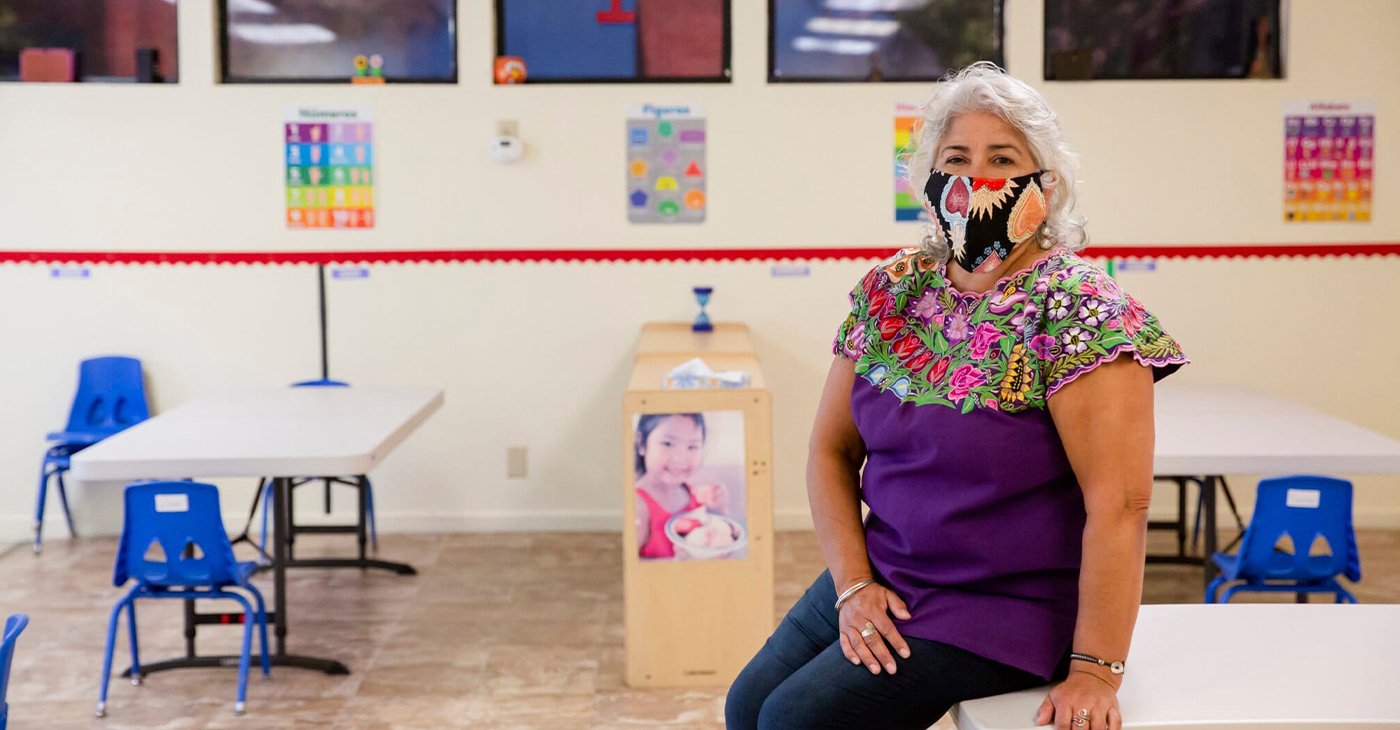
UC Berkeley News
In the first eight months of the COVID-19 pandemic alone, 166,000 childcare jobs were lost across the nation. Significant recovery didn’t begin until the advent of American Rescue Plan Act (ARPA) Child Care Stabilization funds in April 2021.
Today, child care employment is back to slightly above pre-pandemic levels, but job growth has remained sluggish at 1.4% since ARPA funding allocations ended in October 2023, according to analysis by the Center for the Study of Child Care Employment (CSCCE) at UC Berkeley. In the last six months, childcare employment has hovered around 1.1 million.
Yet more than two million American parents report job changes due to problems accessing child care. Why does the childcare sector continue to face a workforce crisis that has predated the pandemic? Inadequate compensation drives high turnover rates and workforce shortages that predate the pandemic. Early childhood educators are skilled professionals; many have more than 15 years of experience and a college degree, but their compensation does not reflect their expertise. The national median hourly wage is $13.07, and only a small proportion of early educators receive benefits.
And now a new round of challenges is about to hit childcare. The low wages paid in early care and education result in 43% of early educator families depending on at least one public support program, such as Medicaid or food stamps, both of which are threatened by potential federal funding cuts. Job numbers will likely fall as many early childhood educators need to find jobs with healthcare benefits or better pay.
In addition, one in five child care workers are immigrants, and executive orders driving deportation and ICE raids will further devastate the entire early care and education system. These stresses are part of the historical lack of respect the workforce faces, despite all they contribute to children, families, and the economy.
Five years ago, as COVID-19 lockdowns and school closures began, most early educators continued to work in person, risking their own health and that of their families. “Early educators were called essential, but they weren’t provided with the personal protective equipment they needed to stay safe,” said CSCCE Executive Director Lea Austin. “There were no special shopping hours or ways for them to access safety materials in those early and scary months of the pandemic, leaving them to compete with other shoppers. One state even advised them to wear trash bags if they couldn’t find PPE.”
The economic impact was equally dire. Even as many providers tried to remain open to ensure their financial security, the combination of higher costs to meet safety protocols and lower revenue from fewer children enrolled led to job losses, increased debt, and program closures.
Eventually, the federal government responded with historic short-term investments through ARPA, which stabilized childcare programs. These funds provided money to increase pay or provide financial relief to early educators to improve their income and well-being. The childcare sector began to slowly recover. Larger job gains were made in 2022 and 2023, and as of November 2023, national job numbers had slightly surpassed pre-pandemic levels, though state and metro areas continued to fluctuate.
Many states have continued to support the workforce after ARPA funding expired in late 2024. In Maine, a salary supplement initiative has provided monthly stipends of $240-$540 to educators working in licensed home- or center-based care, based on education and experience, making it one of the nation’s leaders in its support of early educators. Early educators say the program has enabled them to raise wages, which has improved staff retention. Yet now, Governor Janet Mills is considering cutting the stipend program in half.
“History shows that once an emergency is perceived to have passed, public funding that supports the early care and education workforce is pulled,” says Austin. “You can’t build a stable childcare workforce and system without consistent public investment and respect for all that early educators contribute.”
The Center for the Study of Childcare Employment is the source of this story.
-

 #NNPA BlackPress3 weeks ago
#NNPA BlackPress3 weeks agoTarget Takes a Hit: $12.4 Billion Wiped Out as Boycotts Grow
-

 Activism3 weeks ago
Activism3 weeks agoUndocumented Workers Are Struggling to Feed Themselves. Slashed Budgets and New Immigration Policies Bring Fresh Challenges
-

 #NNPA BlackPress3 weeks ago
#NNPA BlackPress3 weeks agoBREAKING Groundbreaking Singer Angie Stone Dies in Car Accident at 63
-
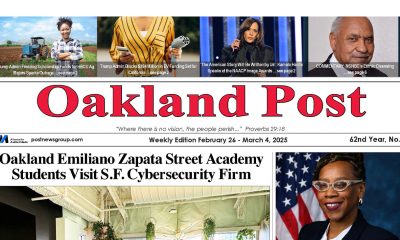
 Activism4 weeks ago
Activism4 weeks agoOakland Post: Week of February 26 – March 4, 2025
-

 #NNPA BlackPress3 weeks ago
#NNPA BlackPress3 weeks agoNAACP Legend and Freedom Fighter Hazel Dukes Passes
-

 #NNPA BlackPress4 weeks ago
#NNPA BlackPress4 weeks agoApple Shareholders Reject Effort to Dismantle DEI Initiatives, Approve $500 Billion U.S. Investment Plan
-

 #NNPA BlackPress4 weeks ago
#NNPA BlackPress4 weeks agoTrump Kicks the Ukrainian President Out of the White House
-

 #NNPA BlackPress4 weeks ago
#NNPA BlackPress4 weeks agoSeniors Beware: O’Malley Says Trump-Musk Cuts Will Cripple Social Security



